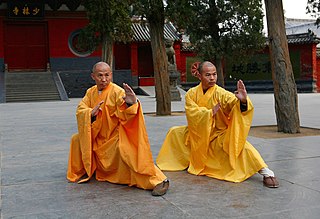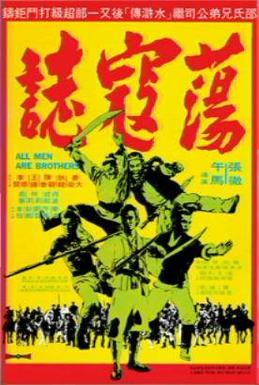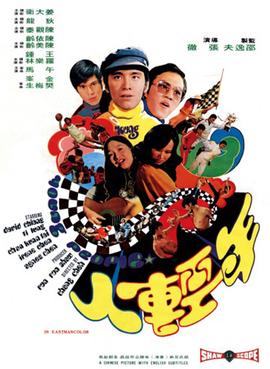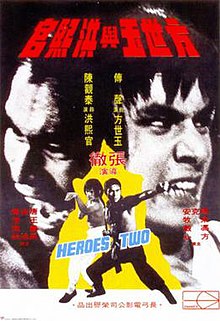Plot
Heroes Two begins with the burning of the Shaolin Temple, and chronicles the efforts of Fang Shi-yu (Alexander Fu Sheng) and Hung Si-kuan (Chen Kuan Tai) as they combat the forces of oppression, fighting alongside the Chinese revolutionaries. Manchurian General Che Kang (Zhu Mu) is a clever Warlord who capitalizes on the naïveté of Fang Shi-yu. Neither man realizes that they fight for the Shaolin cause, and General Che Kang tricks Fang Shi-yu into believing that Hung Si-kuan is a renegade bandit. With the help of the General's henchmen, Fang Shi-yu defeats a bloodied Hung Si-kuan. Then the tough rebel is put into shackles inside the General's castle. Word quickly spreads that Fang Shi-yu beat the unbeatable Shaolin hero, and the local faction of the rebellion attacks the unknowing Fang Shi-yu for his rash actions. When the rebel leader reveals the true nature of Hung Si-kuan, Fang Shi-yu is beside himself. The naïve martial artist initially intends to correct his mistake by sneaking into the General's dungeon and liberating his cohort from the grasp of the Manchurians. However, General Che Kang himself is a powerful Kung Fu practitioner who foils Fang Shi-yu's plans. Once Fang Shi-yu joins his Rebel brothers, they devise a plan to tunnel into the underground prison and rescue Hung Si-kuan. After several tenuous attempts at freeing him, the Shaolin heroes succeed in their task. Now reunited, Fang Shi-yu, Hung Si-kuan, and their Rebel brothers must endure the assault of General Che Kang and his Manchurian army.

Fong Sai-yuk is a semi-fictional Chinese martial artist and folk hero from Zhaoqing City, Guangdong Province of the Qing dynasty. Fong was also associated with Hung Hei-gun and the Five Elders of the Southern Shaolin Monastery. He was a disciple of Shaolin and his martial arts techniques were considered to have contributed to the development of Hung Ga Kuen.
Chang Cheh was a Chinese filmmaker, screenwriter, lyricist and producer active in the 1960s, 1970s and 1980s. Chang Cheh directed more than 90 films in Greater China, the majority of them with the Shaw Brothers Studio in Hong Kong. Most of his films are action films, especially wuxia and kung fu films filled with violence.
Alexander Fu Sheng, also known as Fu Sing, was a Hong Kong martial arts actor. One of Hong Kong's most talented performers, Fu rose to prominence in the 1970s starring in a string of movies with the Shaw Brothers that accrued him international stardom throughout Asia and parts of North America.
Lau Kar-leung was a Chinese actor, filmmaker, choreographer, and martial artist from Hong Kong. Lau is best known for the films he made in the 1970s and 1980s for the Shaw Brothers Studio. His most famous works include The 36th Chamber of Shaolin (1978) starring Gordon Liu as well as Drunken Master II (1994) starring Jackie Chan.

Shek Wing-cheung, better known by his stage name Shih Kien, Sek Kin, Sek Gin or Shek Kin, was a Hong Kong actor and martial artist. Shih is best known for playing antagonists and villains in several early Hong Kong wuxia and martial arts films that dated back to the black-and-white period, and is most familiar to Western audiences for his portrayal of the primary villain, Han, in the 1973 martial arts film Enter the Dragon, which starred Bruce Lee.

Hong Xiguan (1745–1825) was a Chinese martial artist who lived in the Qing dynasty. He was also an influential figure in the Southern Shaolin school of Chinese martial arts. His name is also alternatively romanised as Hung Hei-gun, Hung Hei-koon, Hung Hei-kwun, Hung Hsi-kuan, and similar renditions. He was believed to be the creator and founder of Hung Ga Kuen.
The Venom Mob is a colloquial title given to a group of actors from the Shaw Brothers Studio who attained international prominence for their lead roles in the 1978 film, Five Deadly Venoms. Its members consisted of Lu Feng, Chiang Sheng, Philip Kwok, Sun Chien, Lo Mang, and Wai Pak. Although the main cast have never referred to themselves as the Venom Mob, they have continued to be referred to as such in English-speaking media while English DVD versions of their films often introduced them collectively as The Venoms.
Kung fu film is a subgenre of martial arts films and Hong Kong action cinema set in the contemporary period and featuring realistic martial arts. It lacks the fantasy elements seen in wuxia, a related martial arts genre that uses historical settings based on ancient China. Swordplay is also less common in kung-fu films than in wuxia and fighting is done through unarmed combat.
This is a list of films featuring the Chinese martial arts master and folk hero of Cantonese ethnicity, Wong Fei-hung. There are 123 in total. Where possible alternative titles have been included, particularly the official English language titles or literal translations.

Five Shaolin Masters, a.k.a. 5 Masters of Death, is a 1974 Shaw Brothers kung fu film directed by Chang Cheh, with action choreography by Lau Kar Leung and Lau Kar Wing.

Shaolin Temple, a.k.a. Death Chamber, is a Shaw Brothers film directed by Chang Cheh. It is one of the Shaolin Temple themed martial arts films and concerns their rebellion against the Qings, with an all-star cast featuring the second and third generations of Chang Cheh's stable of actors including David Chiang, Ti Lung, Alexander Fu Sheng and Chi Kuan Chun, as well as cameo appearances by several of the actors that would later become collectively known as the Venoms mob. The film serves as a pseudo-prequel to Five Shaolin Masters.
Shaolin Rescuers is a 1979 Hong Kong martial arts film directed by Chang Cheh, produced by the Shaw Brothers, and starring Jason Pai Piao and the Venom Mob.
Filmography for the Indo-Chinese Hong Kong film actor and martial artist Lo Lieh:

All Men Are Brothers, also known as Seven Soldiers of Kung Fu, is a 1975 Hong Kong wuxia film based on the Chinese classical 14th century novel Water Margin. The film was produced by the Shaw Brothers Studio and directed by Chang Cheh and Wu Ma.

Chen Kuan-tai is a Hong Kong martial arts actor, director, and action choreographer. Chen rose to fame in the early 1970s for his movies with the Shaw Brothers Studio and is credited as being one of the film company's first professionally trained martial artists.
Chiang Sheng was a Taiwanese martial arts actor, director, and action director. Chiang rose to prominence in the late 1970s as a member of the Venom Mob, a group of actors at Shaw Brothers Studio renowned for their acrobatic and martial arts skills.
Carter Wong is a Hong Kong actor and martial artist, who is mainly known for roles in Kung Fu action movies. The biggest movies he was featured in are Big Trouble in Little China (1986), and Yong zheng ming zhang Shao Lin men (1977). As an actor, he contributed to more than seventy martial arts films. He also worked as a stuntman in films, and was the fighting instructor for the movie Rambo III. Wong is still active in martial arts.
Phillip Ko-fei was a Hong Kong based actor, screenwriter and film director.

Young People is a 1972 Hong Kong coming-of-age action drama film directed by Chang Cheh and starring David Chiang, Ti Lung, Chen Kuan-tai, Irene Chan and pop singer Agnes Chan, the younger sister of Irene Chan, in her debut film role.
Fung Hak-on was a Hong Kong actor. He appears in Hong Kong films since the 1960s until mid 2010s.







